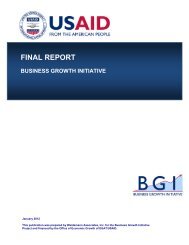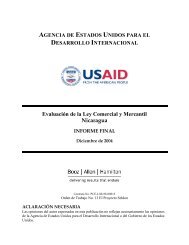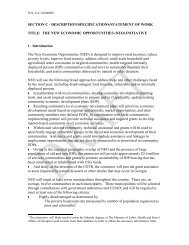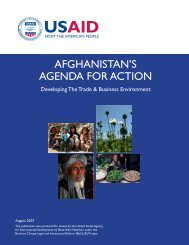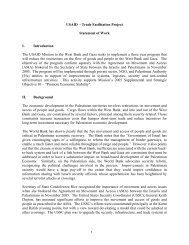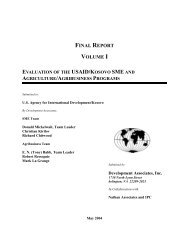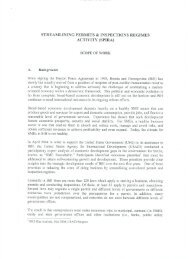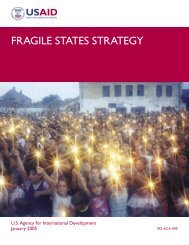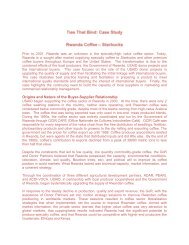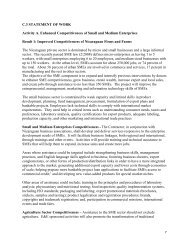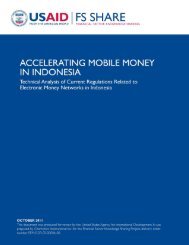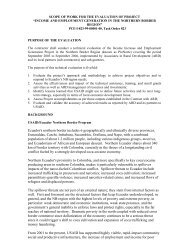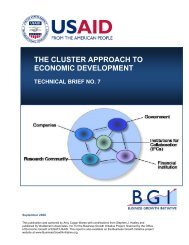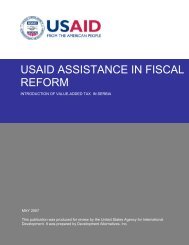Trade and Commercial Law Assessment - Honduras - Economic ...
Trade and Commercial Law Assessment - Honduras - Economic ...
Trade and Commercial Law Assessment - Honduras - Economic ...
Create successful ePaper yourself
Turn your PDF publications into a flip-book with our unique Google optimized e-Paper software.
TRADE AND COMMERCIAL LAW ASSESSMENT DECEMBER 2004HONDURASVI.COLLATERALA. INTRODUCTION<strong>Honduras</strong> has legal mechanisms capable of creating security interests in the various movablegoods that provide the bulk of the world’s wealth today. However, these mechanisms have notbeen developed in practice <strong>and</strong> use. The laws also lack the refinements that drive modern securedtransaction schemes. Specifically, the system lacks provisions that would (a) permitsecuritization arrangements, or loans secured by a set of debt or title instruments (such asmortgages, to cite a common example); (b) enable registration of a summary reference form thatwould fix the priority of a given creditor for a series of transactions secured against the movableassets of a given debtor; (c) allow purchase money security interests to preempt earlier securityinterests; or (d) permit buyers in the ordinary course of business to take collateral free of acreditor’s guaranty.Moreover, the legal procedures for execution in the case of default, while relatively expeditious,are out of step with recent developments in this area. Even within the limited possibilitiespresented by Honduran laws, the risk-averse attitude of lending institutions has stunted the creditmarket in <strong>Honduras</strong>, although banks <strong>and</strong> other credit institutions reported enjoying liquidity offunds that otherwise might support a vigorous supply of credit for SMEs. Inexplicably, given thelaws <strong>and</strong> the liquidity, interest rates run extremely high in <strong>Honduras</strong>, in the neighborhood of 35percent to 40 percent, <strong>and</strong> higher.Contributing significantly to the lack of an active market in secured credit, the Honduran courtsneed significant improvements, particularly related to sophisticated commercial operations.Thus, although the letter of Honduran laws <strong>and</strong> procedures might appear to support collateralguaranties for credit, in practice there is insufficient credit to support commercial growth. Thelack of available credit represents a serious barrier to more dynamic development in <strong>Honduras</strong>. 36Financing in <strong>Honduras</strong> relies today, on mortgage-based loans or loans guaranteed by individualswith immovable collateral to back up their guaranty. 37 This is true of agricultural productionloans <strong>and</strong> other loans in which collateral guaranties may be used as backup security, but not asthe basis for the loan—a phenomenon not uncommon in the CAFTA region as a whole. With theexception of automobile loans to consumers, there is virtually no private credit market in<strong>Honduras</strong> that relies on collateral guaranties. The lenders who occupy the vacuum left by thispractice tend to be public foundations <strong>and</strong> business associations that do not have lendingphilosophies that support <strong>and</strong> encourage development <strong>and</strong> growth. Rather, such last-resort3637Illustrating how lack of credit inhibits growth, a medium-sized business (a manufacturer, wholesaler, <strong>and</strong>exporter of non-patent drugs <strong>and</strong> food supplements) indicated it did not have a line of credit, stating (a) thatinterest rates were too high to make feasible anything other than short-term credit to meet occasional extremesituations, <strong>and</strong> (b) that guaranty requirements were so stringent that any loan would have correlated to only asmall percentage of the movable assets. The owner of the business estimated that its sales would have been atleast four to five times more if the company had access to a line of credit charging a reasonable rate of intereston a loan amount equal to 80 percent or more of the movable assets of the enterprise.Two separate interviewees mentioned a popular saying in <strong>Honduras</strong>, that between borrower <strong>and</strong> lender, “Amorse escribe con ‘h’ de hipoteca.” That is, “Love is spelled with an ‘m’ for mortgage.”VI-1



